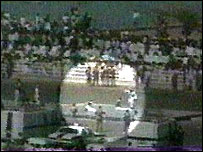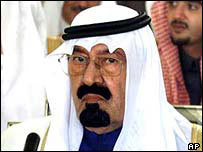
Saudi Arabia's record on human rights has been heavily criticised
|
Saudi police have dispersed a rare demonstration in the capital, Riyadh, and arrested a number of protesters, reports say.
Eyewitnesses say police fired shots in the air to disperse a crowd of a few hundred people who had gathered in the centre of the city to call for reforms.
It is not clear what the aim of the rally was, but it came after an exiled Saudi opposition group - the UK-based Movement for Islamic Reform - had said it planned a sit-in against the detention of government opponents.
Opposition of any kind is banned in the conservative kingdom, and experts say the incident is deeply embarrassing for the Saudi Government, which is hosting its first international human rights conference.
The conference - which opened on Monday - comes as Saudi Arabia announced it would hold its first council elections - the move which is being seen as the first political reform in the country.
During the first full day of the conference on Tuesday, Saudi and other Arab experts put forward Islamic perspectives on human rights.
The BBC's Roger Hardy in Riyadh says the conference is a sign that, in certain respects, this traditionally closed and secretive society wants a more serious dialogue with the rest of the world.
However, he says that some of the participants feel that the conference is long on generalities and short of specifics, with one European expert describing the forum as essentially a public relations exercise.
'No real dialogue'
Academics, diplomats, journalists and human rights activists from across the world are attending the event, which has been organised by the Saudi Red Crescent Society.

Pressure is great on the Gulf monarchy to reform
|
In the first two sessions on Tuesday, the experts stressed that Sharia, the holy law of Islam, must take precedence over the universal declaration of human rights, widely regarded as a basic text of international humanitarian law.
One speaker, a Jordanian judge, said there could be no rapprochement between the two approaches.
Although there are participants from many countries, including Europe and the US, there has so far been no real dialogue between Muslim and non-Muslim views, our correspondent says.
He says that when one Western guest submitted a question asking whether Saudi Arabia's Shia minority enjoyed equal rights with the Sunni majority, the answer came back that they were all Muslims and so had equal rights.
'Altering perceptions'
Saudi Arabia has long been criticised by the international community for its poor record on human rights. But recent events suggest efforts are under way to alter this perception.
The new criminal code forbids torture and suspects are now allowed to have a lawyer present during their questioning and trial.
Citing a desire to "widen the participation of citizens in running local affairs", Saudi authorities also announced their decision to hold council elections, through which half of future council members will be elected, state news agency SPA reported on Monday.
The desert kingdom has not had political elections at any level since its creation in 1932.
Progress
Although human rights groups have welcomed such reforms, they say that in practice the Saudi legal system is still deeply flawed.
New York-based group Human Rights Watch says thousands of people are still being held without trial, there is no free press and women are forbidden to drive.
But BBC correspondent Frank Gardner says optimists have pointed out there is some progress.
Even a few years ago, simply holding a human rights conference inside the country would have been unthinkable, our correspondent says.
